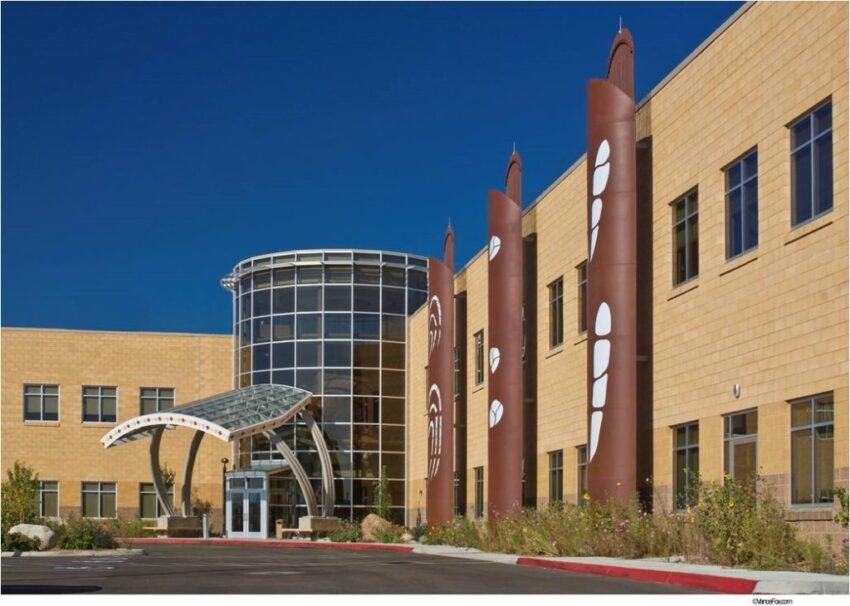The Reno Sparks Tribal Health Center. Indian Health Services, Tribal, and Urban Indian health centers could face new limits on what services they can provide as a result of OBBA. (Photo courtesy Reno-Sparks Indian Colony)
Today, being an active and informed citizen feels more overwhelming, complicated, and daunting than it has under previous administrations. What has unfolded over the past six months makes anyone with a political status or identity with the U.S. government feel anxious about staying on safe, stable ground. As enrolled Tribal members, our political relationship with the federal government is unlike any other racial group or community. Our legal status is supposed to guarantee certain rights, but after centuries of broken treaties and convoluted systems, that’s rarely the reality. The latest One Big Beautiful Bill (OBBB) continues those same tactics long used against Tribal Nations: overcomplicate and underfund.
The OBBB is dangerous, not just because of what it funds, but because of what it quietly strips away. It eliminates life-saving programs and forces those most in need to navigate even more barriers just to access basic support.
Native folks may be exempt from the bill’s SNAP and Medicaid reductions, but when 70% of Indian Health Service (IHS) reimbursements come from Medicaid, those cuts still hit us hard. Stricter billing rules mean IHS, Tribal, and Urban Indian health centers could face new limits on what services they can provide. That means fewer resources for our communities to exercise their treaty-protected right to healthcare.
And that’s not the only front where this bill chips away at our ability to take care of our own people. During the 2025 Nevada State Legislative Session, Tribal students fought to protect funding for professional and doctoral programs, arguing that without Native professionals, our communities remain dependent on systems that were never built for us. Now, as the OBBB reshapes the landscape of federal student loans, especially for medical students, we see a continuation of that same tactic: cutting off support that helps Native people serve Native communities.
The damage doesn’t stop there. The OBBB rolls back key funding and tax credits from the Inflation Reduction Act, one of the most transformative federal investments Indian Country has seen in years. The IRA wasn’t a one-size-fits-all solution but it gave Tribes real tools to take control of our energy, infrastructure, and futures. Now, that opportunity is being pulled out from under us.
These rollbacks aren’t happening by accident. They are being pushed by Republicans in Congress and the Trump administration, who are openly working to gut climate investments and social protections. The OBBB is the result of backroom deals with corporate polluters, fossil fuel lobbyists, and billionaire donors—people who profit when Tribal Nations stay dependent, disconnected, and under-resourced. While Indian Country fights for clean air, electricity, and self-sufficiency, these interests are fighting to protect their wealth and control. Once again, we’re being sacrificed for someone else’s bottom line.
Several clean energy tax credits that Tribes were just starting to access are being phased out. The tax credit for energy-efficient home upgrades ends on December 31, 2025. Projects like better insulation, new windows, or more efficient heating and cooling must begin before that date to qualify. These cuts make it harder for Tribal citizens and governments to lower energy costs and invest in local, reliable power. In some cases, plans will be rushed, shelved, or scrapped altogether.
These aren’t just policy changes. This is power being taken out of Tribal hands.
Approximately 54,000 people living on Tribal lands currently lack electricity. Tribes were finally beginning to build momentum—developing local solar projects, electrifying homes, lowering utility costs, and reducing reliance on outside power grids. These weren’t luxuries. They were the start of long-overdue progress toward basic standards of living and true self-determination.
Cutting these programs doesn’t just stall that progress. It pushes Tribes back into forced dependence. When we can’t generate our own energy, we’re forced to buy it from outside providers. When we lose funding for infrastructure, we lose the chance to create jobs, train our people, and strengthen our local economies. When we don’t have Native doctors, teachers, engineers, or policy experts, we are left to rely on institutions that weren’t built for us and never prioritized our survival.
Were Tribal Nations consulted before these clean energy programs and supports were stripped away? Most likely not. Yet again, our sovereign nations are left to “just deal with it.”
It’s the same cycle over and over: restrict, delay, overcomplicate, and walk away. Meanwhile, we’re told to be grateful for what’s left, to make it work with less, and to stay quiet when what little we had is taken from us. What’s being taken now isn’t just clean energy credits. It’s momentum. It’s hope. It’s our ability to finally build something different for ourselves—something sustainable, something sovereign.
The OBBB is not just a budget bill. It is a message. Even the most promising federal investments in Indian Country can be erased. And when that happens, we are left picking up the pieces again, with even less than before.
We’re not asking for handouts. We’re demanding the chance to build what was already promised to us: the right to power our homes, care for our people, and shape our future on our own terms.
Click this link for the original source of this article.
Author: Susie Brice
This content is courtesy of, and owned and copyrighted by, https://www.nevadacurrent.com and its author. This content is made available by use of the public RSS feed offered by the host site and is used for educational purposes only. If you are the author or represent the host site and would like this content removed now and in the future, please contact USSANews.com using the email address in the Contact page found in the website menu.








